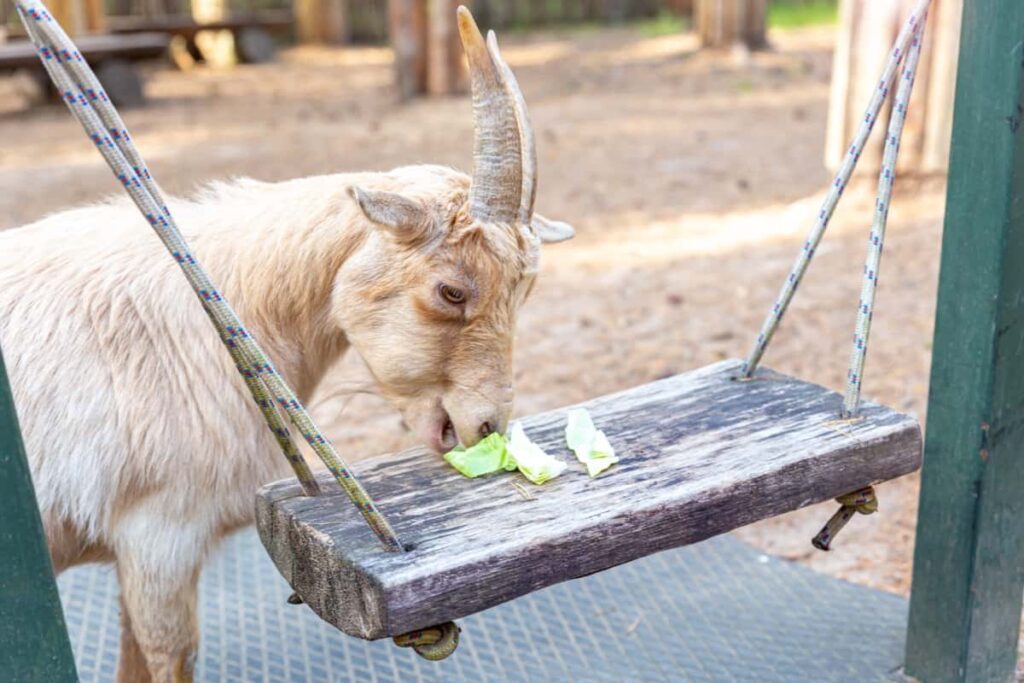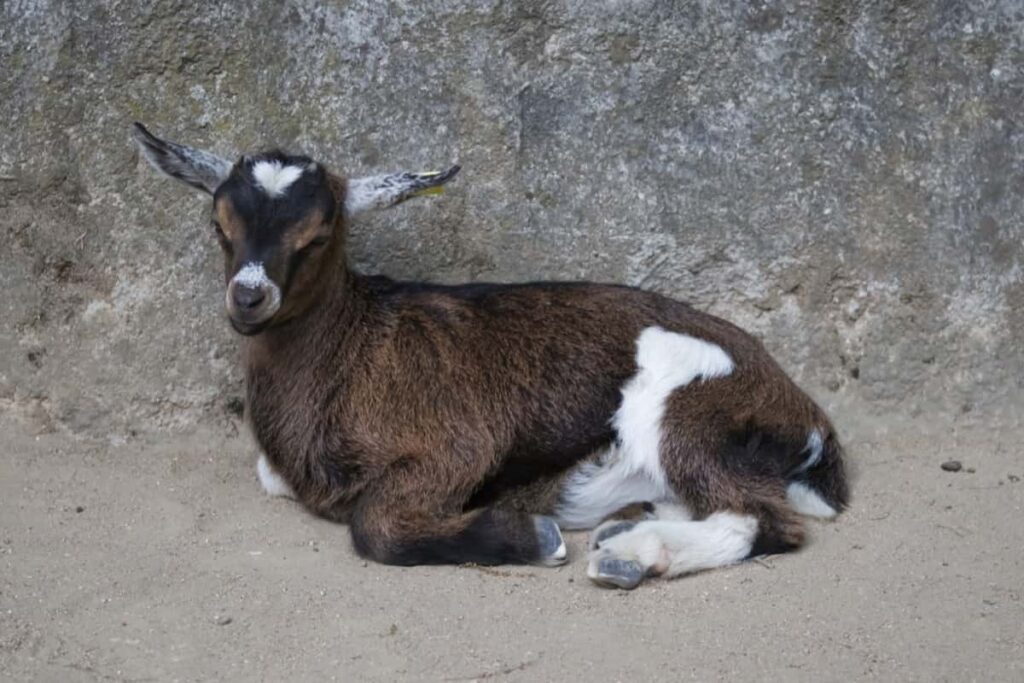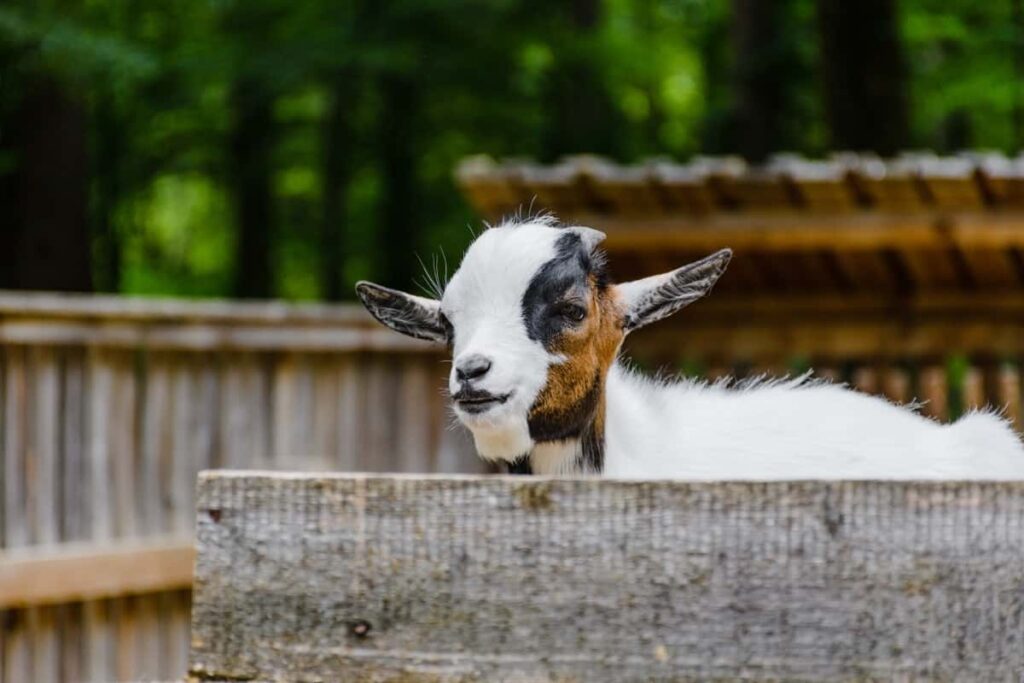Originating from the Cameron Valley in West Africa, Pygmy goats bring with them a rich history. Today, they stand as one of the hardiest goat breeds around. They may be small in size but make up for it with their exceptional milk production capabilities. Additionally, they’re excellent grazers who can thrive on various vegetation options.

Pygmy Goat Care
Determine How Much Shelter You Need
It all depends on the number of goats you have and the climate in which you live. If you only have a couple of pygmy goats, a small shed or sturdy doghouse may be sufficient to protect them from rain, wind, and extreme temperatures. However, if you have a larger herd or live in an area with harsh weather conditions, you may need a larger barn or dedicated goat shelter.
It’s important to remember that pygmy goats are social animals and prefer to be together. So, when considering their shelter needs, ensure enough space for them to rest and move around comfortably. Goats can be sensitive to changes in temperature, so ensuring their living space remains comfortable year-round is crucial. Another factor to consider is protection from predators. Depending on where you live, this could mean reinforcing doors and windows or installing fencing around their enclosure’s perimeter.
Consider The Size of Your Herd
- When caring for pygmy goats, it’s important to consider the number of goats you have in your care. Pygmy goats are social animals and thrive when they have companionship. They are happiest when they interact with at least one other goat.
- A larger herd can provide more opportunities for socialization and play among the goats. It also helps distribute their grazing habits, preventing overgrazing in one area. However, it’s crucial not to overcrowd your space with too many goats. Overcrowding can lead to stress, resource competition, and an increased risk of disease transmission.
Feeding the Correct Diet
- Feeding the correct diet is crucial for the overall health and well-being of your pygmy goats. These small animals have specific dietary needs to be met to ensure they thrive. It’s important to provide your pygmy goats with access to fresh, clean water at all times.
- In terms of their food, a balanced diet is key. Pygmy goats are herbivores and feed on grasses, leaves, shrubs, and other vegetation. Providing them with high-quality hay is essential as it is a staple of their diet.
- By providing a proper and balanced diet for your pygmy goats, you ensure their optimal growth and development while minimizing the risk of health problems associated with nutrition deficiencies.
Grooming Needs of a Pygmy Goat
- Proper grooming is important for the health and well-being of your pygmy goat. These adorable creatures may be small, but they still require regular care to keep them looking and feeling their best.
- One important aspect of grooming is brushing their coat. Pygmy goats have thick, dense coat that can easily become matted if not properly maintained. Regular brushing helps remove dirt, debris, and loose hair while keeping their skin healthy and free from irritations.
- Another crucial part of grooming is trimming their hooves. Overgrown hooves can cause discomfort and lead to ailments such as lameness or infections. An experienced hoof trimmer or veterinarian should do trimming every 6-8 weeks.
- In addition to brushing and hoof trimming, it’s also important to check your pygmy goat’s ears, eyes, and teeth regularly. Clean any debris from the ears using a soft cloth moistened with warm water. Keep an eye out for any signs of infection or discharge.
In case you missed it: Effective and Profitable Commercial Goat Farming: Key Rules to Start from Scratch, Best Milk and Meat Goat Breeds

Maintaining the Goats’ Health
- Maintaining the health of your pygmy goats is crucial to ensuring their well-being and longevity. These adorable creatures require regular care and attention to stay healthy and happy.
- It’s important to provide a balanced diet for your pygmy goats. They should have access to fresh hay, their main fiber source. Additionally, a good quality goat pellet can be given in moderate amounts to supplement their diet. It’s also essential to always provide them with ample clean water.
- Creating a safe environment for your pygmy goats will also contribute greatly to their well-being. Providing shelter from extreme weather conditions such as rain or excessive heat is equally important.
Training & Behavior Requirements
- One important aspect of pygmy goat care is understanding their training and behavior requirements. Start by establishing a routine for feeding and handling your goats. This will help them become familiar with you and build trust over time. Use treats or rewards to reinforce desired behaviors, such as walking on a leash or standing still for grooming.
- Understanding the behavior patterns of pygmy goats will allow you to anticipate any potential issues before they arise. For example, if a goat starts displaying aggressive behavior towards humans or other animals, it might need additional socialization or specialized training.
Breeding and Birthing of Pygmy Goats
It’s essential to ensure that male and female goats are healthy and in prime condition. Before mating them, ensure they have received all necessary vaccinations and deworming treatments. It’s also crucial to closely monitor their diet during this time, ensuring they receive adequate nutrition.
Once successfully mated, the gestation period for a pygmy goat is approximately 145-155 days. As the due date approaches, provide a clean and comfortable area for the expectant mother where she can safely give birth. It’s advisable to monitor her during labor if any complications arise closely. Make sure kids are nursing properly within their first few hours of life.
Common Diseases, Illnesses, and Conditions in Pygmy Goats
- Some common health issues affecting pygmy goats include respiratory infections, parasites such as worms and lice, hoof problems like foot rot or abscesses, mastitis in females after giving birth, and nutritional deficiencies.
- Disease prevention in goats is key to your goats’ health. Regular veterinary check-ups are essential for early detection and treatment of potential health issues. Ensure your goats have access to clean water and provide a balanced diet of quality hay or pasture grass and appropriate supplements.
- Proper hygiene practices also play an important role in maintaining the overall health of your herd. Keep their living area clean and dry to prevent the buildup of bacteria or mold, which can cause respiratory problems, among other issues.
Regular Veterinary Check-Ups
Schedule regular visits with a veterinarian specializing in goat care to monitor their overall health and proactively address potential issues. Vaccinations, deworming, hoof trimming – all these tasks play a vital role in maintaining the overall well-being of your friends.
In case you missed it: Pregnant Goat Care: A Comprehensive Information Guide

Conclusion
Understanding the behavior patterns of pygmy goats can greatly aid in training them effectively. Maintaining the overall health of your pygmy goats is essential. Vaccinations and deworming treatments are also vital for disease prevention. You can teach them basic commands and encourage positive behaviors with patience and consistency.
- Types of Grass Growing for Goat Farm
- How to Train Goats for Milking: A Beginners Guide
- Goat Milking Practices and Equipment: A Beginner’s Guide
- Goat Farming for Fiber: Producing Mohair and Cashmere
- Maximizing Goat Milk Production: Tips for Dairy Goat Farmers
- Goat Farming as a Family Business: Strategies for Success
- Profitable Kenya Goat Breeds for Commercial Dairy and Meat Business
- Unlock the Secrets of Oberhasli Goat: Discover Raising and Management Practices
- Ultimate Guide to Myotonic Goats: Explore Profile to Raising